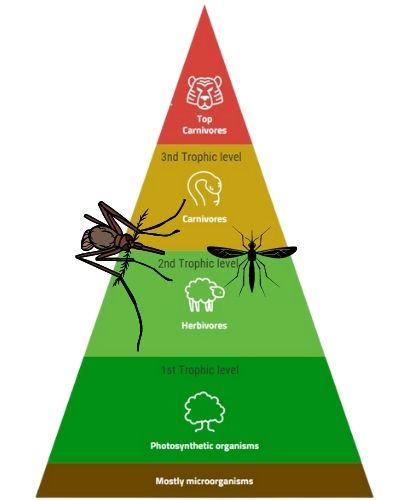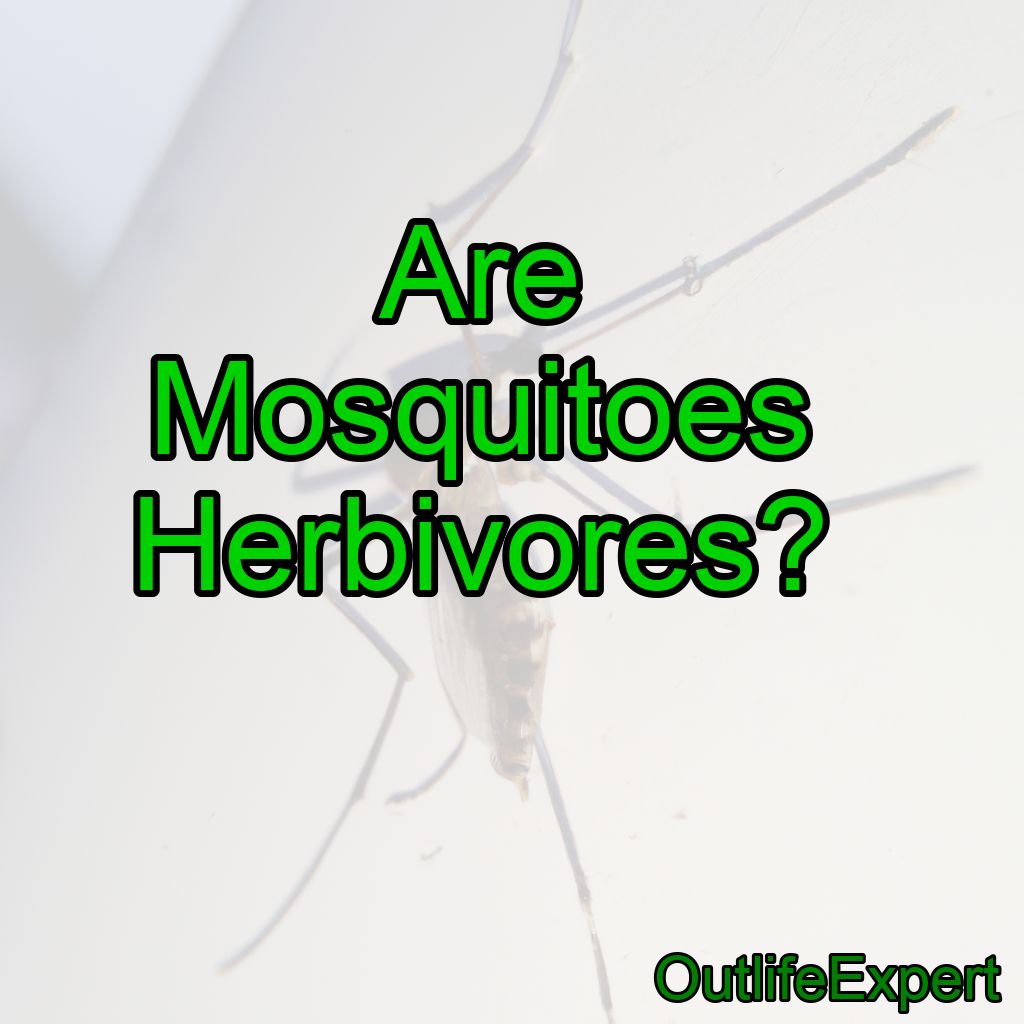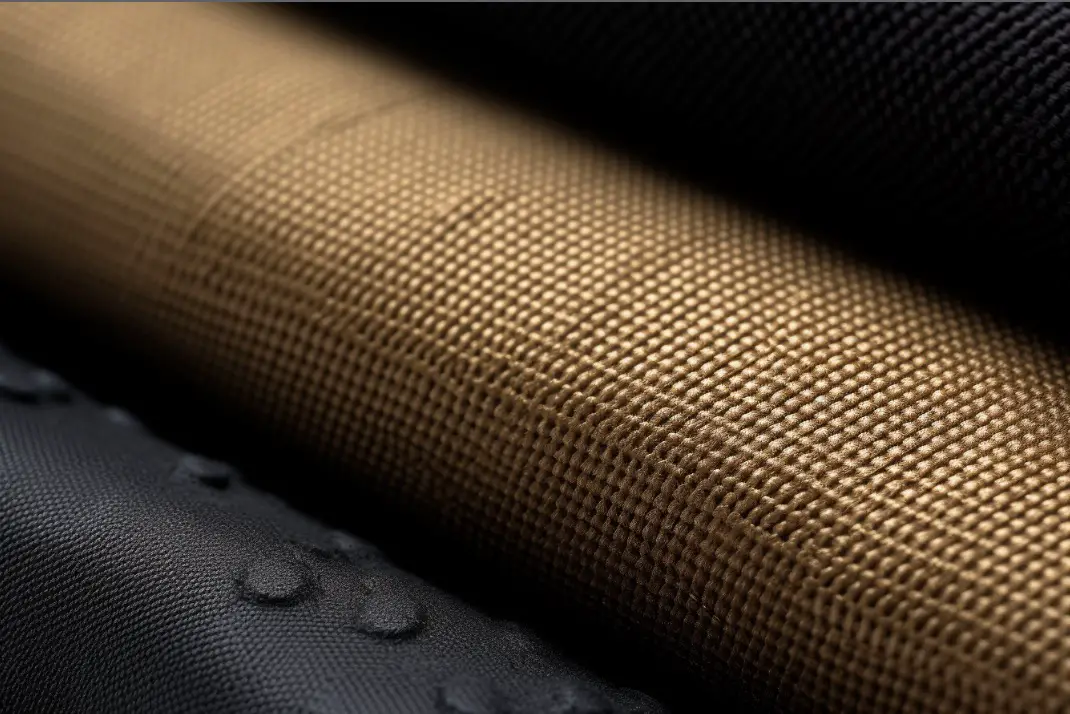The main question that comes to mind when thinking about mosquitoes is, are they herbivores? In this blog post, we will explore this topic in depth and learn more about the feeding habits of these little creatures. As an expert in the field, I have had the opportunity to study mosquitoes up close and personal, and I will share my first-hand experience and personal perspective on this matter.
Contents
Mosquitoes: A Brief Overview
Before diving into their diet, let’s first explore what mosquitoes are and why they are so important. Mosquitoes are small, flying insects belonging to the family Culicidae. There are more than 3,500 species of mosquitoes worldwide, and they can be found in almost every part of the world, except for extremely cold regions like Antarctica.
The Role of Mosquitoes in the Ecosystem
Mosquitoes play an essential role in the ecosystem, serving as food for many animals such as birds, bats, and fish. They also help in pollination, as they feed on nectar from flowers. However, mosquitoes are also known for carrying and transmitting various diseases to humans, such as malaria, dengue fever, and Zika virus, which has made them one of the most dangerous animals on Earth.

The Feeding Habits of Mosquitoes
Now that we have a basic understanding of mosquitoes, let’s dive into their feeding habits. Mosquitoes have a unique mouthpart called the proboscis, which they use to pierce the skin of their host and suck blood or nectar. The feeding habits of mosquitoes vary depending on their species and sex.
Male Mosquitoes: The Herbivores
Male mosquitoes are primarily herbivores, meaning that they feed on plant-based sources. Their main source of nutrition is floral nectar, which provides them with the energy they need for flying and mating. Male mosquitoes do not have the necessary mouthparts to pierce the skin and suck blood, so they are not a threat to humans or animals in terms of disease transmission.
Female Mosquitoes: The Bloodsuckers
Female mosquitoes, on the other hand, are not strictly herbivores. While they also feed on nectar for energy, they require blood meals to produce eggs. The blood meal provides the necessary proteins and nutrients for egg development. It is the female mosquitoes that are responsible for transmitting diseases to humans and animals, as they are the ones that bite and suck blood.
Mosquitoes and Pollination
Mosquitoes are not the most efficient pollinators, but they still play a role in the pollination process. When mosquitoes feed on nectar, they inadvertently transfer pollen from one flower to another, thus helping in the reproduction of plants. Some studies have shown that mosquitoes can be the primary pollinators for certain plant species, particularly in the Arctic region where other pollinators are scarce.
Mosquitoes and Orchids
One fascinating example of mosquito pollination is the case of the blunt-leaved bog orchid (Platanthera obtusata). This orchid species relies on mosquitoes, particularly the Aedes species, for pollination. The orchid releases a scent that attracts the mosquitoes, and as they feed on the nectar, they pick up pollen and transfer it to other flowers, thus ensuring the reproduction of the orchid.
Mosquitoes and Disease Transmission
As mentioned earlier, female mosquitoes are responsible for transmitting diseases to humans and animals. This occurs when they bite and suck blood from an infected host, and then bite another host, transferring the pathogens through their saliva.
Malaria
Malaria is a life-threatening disease caused by Plasmodium parasites, which are transmitted to humans through the bites of infected Anopheles mosquitoes. Malaria is prevalent in tropical and subtropical regions, such as sub-Saharan Africa, South Asia, and South America. According to the World Health Organization, there were an estimated 229 million cases of malaria worldwide in 2019, resulting in 409,000 deaths.
Dengue Fever
Dengue fever is a viral illness caused by the dengue virus, which is transmitted to humans through the bite of infected Aedes mosquitoes. Dengue is prevalent in tropical and subtropical regions, with an estimated 100-400 million infections occurring each year. There is no specific treatment for dengue, and severe cases can lead to dengue hemorrhagic fever, which can be fatal.
Zika Virus
Zika virus is a mosquito-borne virus that is primarily transmitted through the bite of infected Aedes mosquitoes. Zika virus infection during pregnancy can cause birth defects such as microcephaly, and it has also been linked to neurological disorders like Guillain-Barré syndrome. There is currently no vaccine or specific treatment for Zika virus infection.
Mosquito Control and Prevention
Given the significant health risks associated with mosquitoes, it is crucial to implement mosquito control and prevention measures to reduce their population and the spread of diseases.
Personal Protective Measures
To protect yourself from mosquito bites, you can use insect repellents containing DEET, picaridin, or oil of lemon eucalyptus. Wearing long sleeves, pants, and socks can also help reduce the chances of being bitten. Additionally, using bed nets and window screens can help keep mosquitoes out of your living space.
Environmental Control
To control mosquito populations, it is essential to eliminate their breeding grounds. Mosquitoes lay their eggs in standing water, so it is crucial to regularly empty containers that hold water, such as flowerpots, birdbaths, and tires. Insecticides can also be used to kill adult mosquitoes and larvicides to target their larvae.
Conclusion: Are Mosquitoes Herbivores?
To answer the question, “Are mosquitoes herbivores?” we should consider the differences between male and female mosquitoes. While male mosquitoes are herbivores, feeding primarily on nectar, female mosquitoes are not strictly herbivores, as they require blood meals for reproduction. Here are ten essential facts about mosquitoes and their feeding habits:
1.Mosquitoes belong to the family Culicidaeand can be found almost everywhere in the world.
2. They play an essential role in theecosystem as food for various animalsandpollinatorsfor certain plants.
3. Mosquitoes have a unique mouthpart called theproboscisto pierce the skin and suck blood or nectar.
4.Male mosquitoes are herbivoresand feed on plant-based sources like nectar.
5.Female mosquitoes require blood mealsto produce eggs and can transmit diseases to humans and animals.
6. Mosquitoes can play a role inpollination, particularly in regions where other pollinators are scarce.
7. They are responsible for transmitting diseases likemalaria, dengue fever, and Zika virus.
8. Personal protective measures, such as usinginsect repellentsand wearing protective clothing, can help prevent mosquito bites.
9. Environmental control, like eliminating standing water and using insecticides, can help reduce mosquito populations.
10. While mosquitoes can be dangerous due to their role in disease transmission, they are also an integral part of the ecosystem and contribute to the pollination of certain plant species.
FAQs
Is a mosquito fish a herbivore carnivore or omnivore?
Mosquito fish are omnivores, meaning they eat both plant and animal material.
What does mosquito fish eat?
Mosquito fish primarily feed on mosquito larvae, but they also eat other small aquatic insects and invertebrates.
What does mosquito feed on?
Female mosquitoes feed on the blood of animals, including humans, to obtain the necessary protein for egg development. Male mosquitoes, on the other hand, feed on nectar and other plant juices.
Do mosquitoes feed on meat?
Yes, female mosquitoes feed on the blood of animals, including humans, for protein to develop their eggs. However, male mosquitoes do not feed on blood and instead feed on nectar and other plant juices.
Is mosquito a carnivorous insect?
Yes, mosquitoes are carnivorous insects that feed on the blood of animals, including humans.
Do mosquitoes eat anything other than blood?
Yes, mosquitoes also feed on nectar and other plant sugars.




